We bet your cell phone is somewhere near you. And in case you’ve got an SMS, you will open it straight away, right? According to the statistics, it takes an average user 5 seconds to read a text message, making SMS marketing an effective communication tool.
Read on to find out how text messages can help you increase your sales, win customer loyalty, and improve the overall marketing strategy.
Why SMS marketing is so effective
On average, users spend over an hour a day checking their phones. Marketers try to get hold of this fact by delivering their offers through messengers, web push notifications, emails, and mobile default texting service — SMS.
Even though emails have been around for a long time, SMS marketing tends to knock it out: 98% of SMS get opened while only 20% of emails are looked at. People are more responsive to text messages as they associate them with more personal communication.
In fact, 75% of users choose SMS over emails as a predominant channel of interaction with businesses, especially when it comes to appointment reminders, financial transactions, and prescription refills.
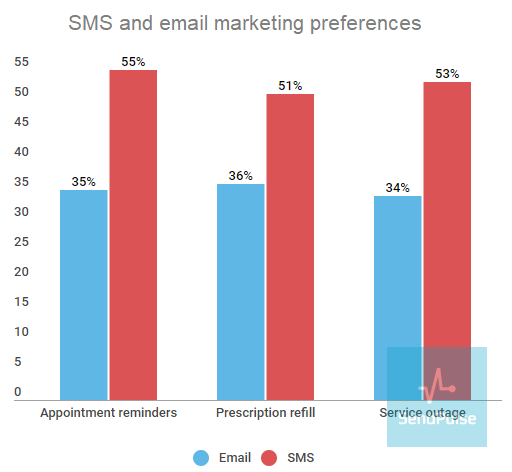 Source: Flowroute
Source: Flowroute
Pros and Cons of SMS marketing
SMS marketing shows high open rates as bulk SMS campaigns get opened in 99% of cases. On top of that, texts are fast to create, as you don’t need to craft a long copy or think about images. Moreover, they guarantee swift informing — an average SMS gets opened within 3 minutes.
However, in case your SMS is too long, it can either be delivered portion-wise or not delivered at all. This is why you should always squeeze your offer into the limit of a single SMS copy — 160 characters. Apart from that, you can get blacklisted if you text those who never subscribed to your messages or if your messages appear to be too annoying.
How to plan your SMS marketing strategy
In case you’re getting ready for your very first SMS campaign or a big holiday one, you’d better prepare your database in advance.
1. Get permission to send SMS campaigns
Let’s say a user left their phone number to get notified when the certain item is back in stock. After the actual notification, the user gets bombarded with promotional messages, although they have never agreed to receive them. Run a fair SMS campaign and make sure you first got the subscribers’ explicit permission to text them.
Versace, for example, asks for the user’s phone number at the sign-up stage. The user can agree to get notifications through the indicated communicational channels by ticking a corresponding box.
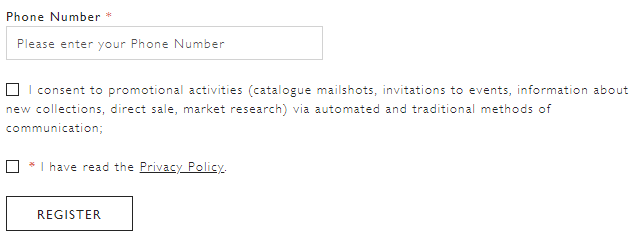 Registration form on Versace website
Registration form on Versace website
2. Set your goals
Before you get going, decide why you’ll be doing an SMS campaign. This way, you’ll be able to choose winning tactics to meet your goals. Do you need to drive traffic to your website or boost your sales? Then make sure your text message contains a short URL leading to the website or the offers that will be hard to ignore.
3. Segment and personalize
Divide your subscribers according to their age, location or preferences to get a clearer view of what offers you need to come up with.
Let’s say you market accessories and one of your segments is located in the area with heavy rains. By sending an SMS campaign with a discount on umbrellas, you’ll showcase your care about that particular portion of subscribers and bring in an offer that will be relevant to them.
4. Analyze your SMS campaign
Measure your marketing success to understand how your campaign went and what should be improved in it. Track users engagement by monitoring opens, clicks, and time a subscriber spent on a website after receiving your SMS. This way you’ll be able to plan your budget and further marketing activities.
Tips to create a successful SMS marketing campaign
Take a look at the list of lifehacks to build trust with subscribers and stay away from getting blocked on their phones.
Write your name instead of the number
Inform the recipients who is addressing them by indicating the name of your company instead of a phone number. This option is called alpha name and it can be applied right in the service you’re sending from. Limit the sender name to 11 characters so that it will be fully visible on the screen. In case of a long brand’s name, shorten it so that the recipients can recognize the sender with no sweat.
Below you can see an example of a possible SMS campaign dedicated to Halloween. The sender’s name is specified, so if a user gets interested in the offer, they will know the website where they should look it for.
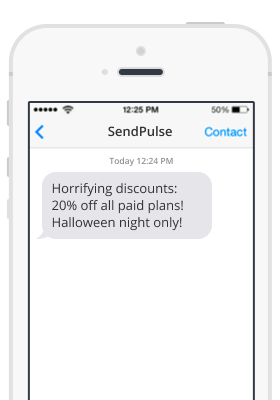 An SMS with alpha sender name
An SMS with alpha sender name
Create short and informative messages
Be extremely precise about your message: indicate the core concept of your special offer and make it easy to take part in it. Limit your SMS to 160 characters to create an SMS copy that converts and doesn’t bore the recipient.
The SMS below, for example, saves the reader’s time and highlights only key information about the message: who? what? when?
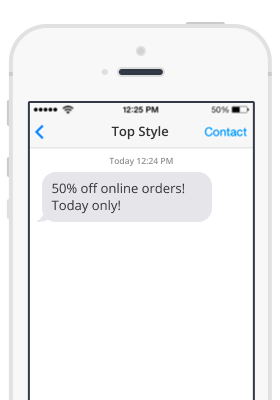 An SMS with sale details
An SMS with sale details
Choose the timing and frequency wisely
Keep in mind that your subscribers may be located in different time zones. You don’t want to disturb your subscribers at midnight while they’re sleeping or early in the morning while they’re getting ready for work. Study your audience, segment them according to their location, and send your texts within reasonable business hours so that your recipients can react to your offer.
Be careful with sending your messages too often and try to find a balance between staying top of mind and not being annoying. According to the statistics, the optimal SMS sending frequency is 5-6 messages a month.
Bring value
To deliver value with your SMS, send the shipping details or delivery status to the customers. Run recurring SMS campaigns such as birthday congrats or other milestone triggered messages to add a personal touch to your text message.
The users usually watch their purchases carefully, so reduce their worrying notifying them about their order, just like in the SMS below.
 An SMS with shipping details
An SMS with shipping details
Integrate SMS with other channels and automate the workflow
Integrate your SMS campaign with other forms of online communication such as emails or web push notifications to engage a wider audience into your community. Automate such workflows to send only timely and relevant messages.
This is how you can knit text messages with emails and web push notifications into an automated workflow using Automation 360:
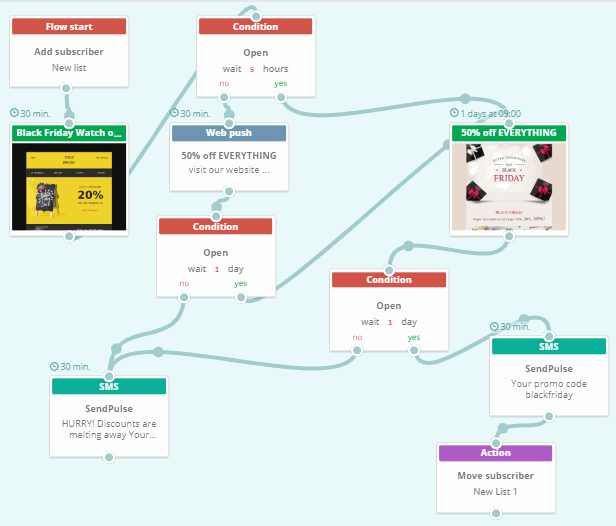 The automated workflow created with SendPulse
The automated workflow created with SendPulse
Make it easy to unsubscribe
Let your subscribers know they can opt out from receiving your SMS campaigns whenever they want to establish trust and credibility. For example, you can offer them to respond to you with opt-out words like STOP, UNSUBSCRIBE, END or include an unsubscribe URL in your message by following which a user will be automatically removed from the list.
With the smartphone becoming today’s core communication device, marketers shouldn’t but take full advantage of them. To make SMS your next email marketing helper, work out a thorough plan of your text messaging campaign and stick to some common rules to create an SMS copy that converts. Integrate it with other communication channels, and SendPulse will help with the automation!